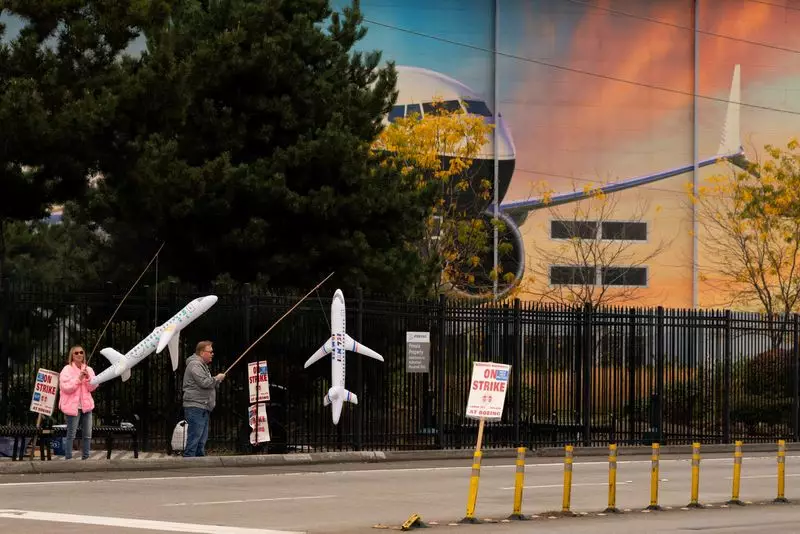In a stark reflection of its ongoing financial difficulties, Boeing has announced the elimination of 17,000 jobs, which constitutes approximately 10% of its global workforce. The decision comes as the company grapples with a significant cash flow crisis and an ongoing strike involving 33,000 union workers on the U.S. West Coast. These layoffs are part of a broader strategy articulated by newly appointed CEO Kelly Ortberg, aimed at realigning the company’s operations with its challenging financial reality.
Ortberg, who took the reins in August, indicated that these substantial job cuts are essential to streamline operations and focus on critical business priorities. His communication to employees made it clear that the company needs to reassess its workforce levels amidst escalating pressures to fulfill financial obligations and commitments. This reduction will affect all tiers within the organization, including corporate executives and managerial staff. Following the announcement, Boeing’s stock experienced a slight dip in after-hours trading, underscoring investor concerns regarding the company’s stability.
Boeing’s third-quarter performance is projected to reflect a staggering $5 billion loss, driven by accumulating pre-tax charges across various segments of its business, particularly in defense and commercial aircraft programs. The company expects to report revenues of $17.8 billion with a loss per share reaching $9.97, presenting an unfavorable outlook that places Boeing under intense scrutiny from market analysts. The anticipated negative operating cash flow of $1.3 billion suggests that the company is enduring a more severe financial strain than what experts had initially predicted.
The delay in the delivery of the much-anticipated 777X jet has now been pushed to 2026. This postponement has been attributed to complications arising from the current labor strike, ongoing development challenges, and extended flight testing holds. Such setbacks not only erode potential revenue streams but also jeopardize long-term customer relationships and trust in Boeing’s production capabilities. As the company strives to mend its fractured reputation, the implications of failing to deliver on time remain critical.
Adding complexity to the situation, Boeing has filed an unfair-labor-practice charge, accusing the machinist union of negotiating in bad faith, signaling deepening tensions between management and employees. As the company moves forward with workforce reductions, industry observers speculate that the pressure of potential job losses will likely motivate striking workers to expedite negotiations for a new labor agreement. Equity manager Thomas Hayes articulates this sentiment, suggesting that financial anxiety may ultimately push strikers back to the negotiating table.
Amidst these labor disputes, analysts estimate that Boeing is losing approximately $1 billion monthly due to the protracted strike. Such losses pose risks to Boeing’s coveted investment-grade credit rating, which hangs by a thread as the company faces mounting debts exceeding $60 billion. With its financial health deteriorating, the need for a swift resolution becomes increasingly urgent not only for operational stability but for the sustainability of Boeing as a leading player in the aerospace industry.
In light of the recent upheaval, Boeing’s leadership is keenly aware of the necessity for transformative strategies to reposition the company for recovery. Part of this adjustment includes the cessation of the 767 freighter program slated for 2027, while production of the KC-46A Tanker will continue. The cessation reflects broader trend shifts in market dynamics and the need for Boeing to optimize its aircraft lineup, aligning production with demand in a rapidly evolving aerospace landscape.
Moreover, as Boeing seeks to stabilize its financial footing, there are ongoing considerations of raising substantial capital through stock sales and equity-like securities, potentially drawing in upwards of $10 billion. This influx could play a pivotal role in ensuring the company retains structural integrity amid operational reforms. However, the specter of bankruptcy looms, and any missteps in executing these plans could lead to dire consequences.
Boeing stands at a crossroads defined by profound challenges and uncertain prospects. The broad workforce cuts and delayed project timelines illustrate a company at a critical juncture—struggling to recover from past mismanagement while navigating a turbulent labor landscape. With options for financial recovery hinging on swift negotiations and strategic pivots, its ability to rebound will be closely watched by industry stakeholders. Boeing’s future now rests on its commitment to smarter operations and labor relations, as it endeavors to regain confidence in its brand and rebuild its market standing.

